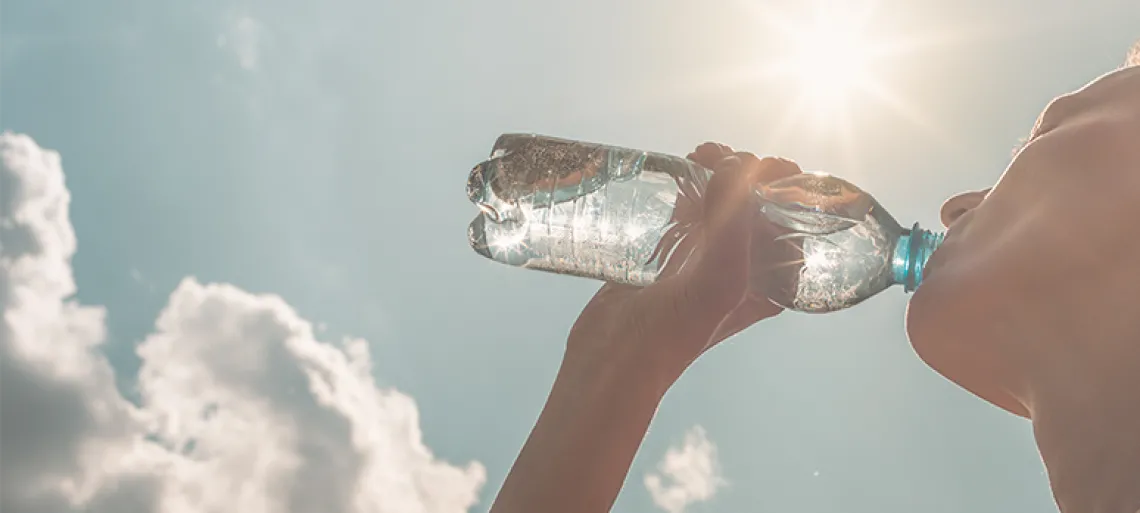Staying Safe During Extreme Heat

Extreme heat is a period of high heat and humidity with temperatures above 90 degrees Fahrenheit for at least two to three days. In extreme heat, your body works extra hard to maintain a normal temperature.
Heat-related deaths and illnesses are preventable, yet more than 700 people die from extreme heat every year in the United States. Take measures to stay cool, remain hydrated, and keep informed.
How to Prepare for Extreme Heat
- Learn to recognize the signs of heat illness such as heat stroke, heat cramps and heat exhaustion.
- Do not rely on a fan as your primary cooling device. Fans create air flow and a false sense of comfort but do not reduce body temperature or prevent heat-related illnesses.
- Identify places in your community where you can go to get cool such as libraries and shopping malls or contact your local health department to find a cooling center in your area.
- Cover windows with drapes or shades.
- Weather-strip doors and windows.
- Use window reflectors specifically designed to reflect heat back outside.
- Add insulation to keep the heat out.
- Use a powered attic ventilator, or attic fan, to regulate the heat level of a building’s attic by clearing out hot air.
- Install window air conditioners and insulate them.
- If you are unable to afford your cooling costs, weatherization or energy-related home repairs, contact the Low Income Home Energy Assistance Program (LIHEAP) for help.
How to Stay Safe During Periods of Extreme Heat
- Never leave people or pets in a closed car on a warm day.
- If air conditioning is not available in your home go to a cooling center.
- Take cool showers or baths.
- Wear loose, lightweight, light-colored clothing.
- Use your oven less to help reduce the temperature in your home.
- If you have to be outside, find shade. Wear a hat wide enough to protect your face.
- Drink plenty of fluids to stay hydrated.
- Avoid high-energy activities or work outdoors, during the midday heat, if possible.
- Check on family members, seniors and neighbors.
- Watch for heat cramps, heat exhaustion and heatstroke.
- Consider pet safety. If they are outside, make sure they have plenty of cool water and access to comfortable shade. Asphalt and dark pavement can be very hot to your pet’s feet.
- If using a mask, use one that is made of breathable fabric, such as cotton, instead of polyester. Do not wear a mask if you feel yourself overheating or have trouble breathing.
Risk Factors
The main things affecting your body’s ability to cool itself during extremely hot weather are:
- High humidity: When the humidity is high, sweat will not evaporate as quickly. This keeps your body from releasing heat as fast as it may need to.
- Personal factors: Such factors include age, obesity, fever, dehydration, heart disease, mental illness, poor circulation, sunburn, and prescription drug and alcohol use all can play a role in whether a person can cool off enough in very hot weather.
Those who are at the highest risk of heat illness include people 65 and older, children younger than two, and people with chronic diseases or mental illness.
Closely monitor people who depend on you for their care and ask these questions:
- Are they drinking enough water?
- Do they have access to air conditioning?
- Do they need help keeping cool?
Resources
- National Center for Environmental Health (part of the Centers for Disease Control and Prevention): www.cdc.gov/nceh/features/extremeheat
- Ready.gov: ww.ready.gov/heat
- U.S. Department of Health and Human Services: www.hhs.gov
©2023 ComPsych ® Corporation. All rights reserved. This information is for educational purposes only. It is always important to consult with the appropriate professional on financial, medical, legal, behavioral or other issues. As you read this information, it is your responsibility to make sure that the facts and ideas apply to your situation.

